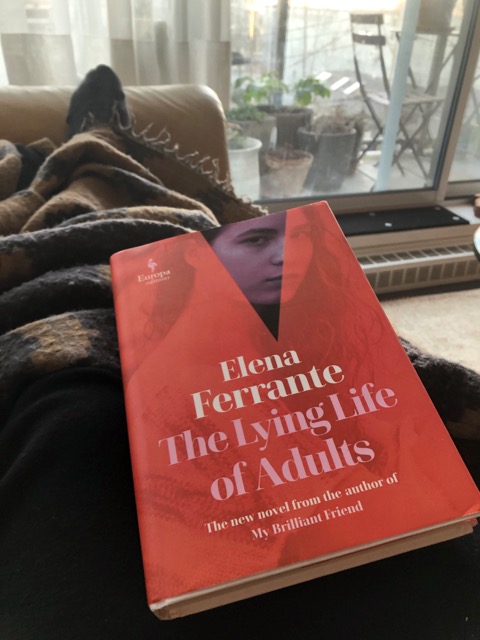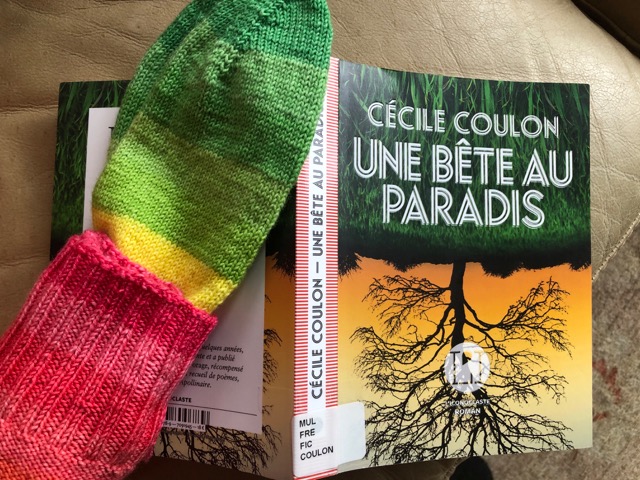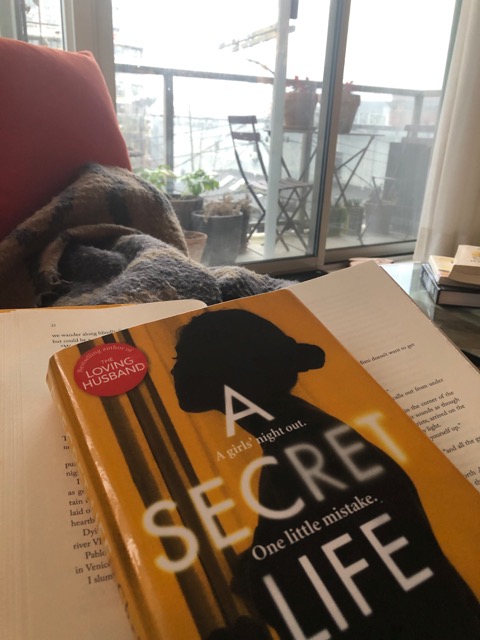Whew! That's a title, eh? I figured you might be wearying of "November Books Read, Books Read in December, January Books Read, etc., but I couldn't quite rise to snappy. I'll try harder next month . . . (if I remember ;-)
Here are the titles, numbered as they appear in my handwritten Reading Journal:
8. Jane Smiley, Perestroika in Paris, contemporary fiction, fable/fairytale for adults, equestrian, Paris, talking animals
9. Elena Ferrante, The Lying Life of Adults, literary fiction, fiction in translation, Italy, Naples, coming-of-age, lives of girls and women, family, marriage
10. Clare Hunter, Threads of Life: A History of the World Through the Eye of a Needle, memoir, creative-non-fiction, cultural history, sewing, embroidery, activism
11. Cécile Coulon, Une Bête au Paradis, contemporary fiction, French contemporary fiction, en français, love and disappointment, family generations, country/farm life,
12. Christobel Kent, A Secret Life, domestic thriller, set in contemporary London and suburbs
13. Katherine May, Wintering: The Power of Rest and Retreat in Difficult Times, memoir, self-help, winter, reflection, slowing down
14. Thomas King, Indians on Vacation, literary fiction, contemporary fiction, First Nations/Native American writer, European vacation, armchair travel with a twist, aging protagonist, longterm marriage
15. Elly Griffiths, The Lantern Men, mystery, female protagonist, feminist writer, Ruth Galloway series, archaeology, academe, set in England
16. Anthony Horowitz, Moonflower Madness, mystery, meta-mystery, book-within-a-book, female protagonist, set in England
and one that I began, and then abandoned at five chapters, Jan-Philipp Sendker's The Art of Hearing Heartbeats
And here are the pages from my Reading Journal with links to my Instagram posts:
It took me a while to get 'round to Jane Smiley's Perestroika in Paris because I just wasn't in the mood for what I thought would be a book about Russian politics in the City of Light. But when I noticed a few discerning readers delighting in it, I quickly put it on hold at the library and got an e-book version not long after -- Turns out there is a "restructuring of economic and politic activity" -- signalled by the name of an escaped race horse, Perestroika -- but it takes place around three displaced animals who throw their lot together. . . .
If you're skeptical about reading a novel featuring talking animals, let me remind you that Paris can make all magic seem entirely credible. . . (for other brilliant talking-animal novels set outside of Paris, may I suggest André Alexis's Fifteen Dogs; and for more magic-tinted Paris, have you read C.S. Richardson's The Emperor of Paris?Recommended!
Elena Ferrante's The Lying Life of Adults, which I borrowed from my daughter, to whom I'd given it for Christmas. Powerfully and uncomfortably intimate view of Giovanna's parents, their marriage, the possibilities their lives suggest to her, in the voice of a just-pubescent girl confusedly fumbling her way to womanhood. Confusedly fumbling, but also increasingly determined, deliberate. . .
As in her Neapolitan quartet, Ferrante is uncannily revealing about the thoughts and feelings of girls and women, nearly microscopic in her vision, voicing phenomena we instantly recognize but rarely articulate or see articulated. As in the quartet, Naples is another character here, but a different Naples, higher up the hill, more educated, polished, and also beginning decades later.
I wrestled with the ending, found it unsettling. . . but finally, I find it oddly hopeful. Giovanna sets out her own terms. . . I'll be curious to know what you think.
Next up was Clare Hunter's Threads of Life: A History of the World through the Eye of a Needle -- a title which suggests a broader claim than this cultural-history/memoir can live up to. But Hunter takes us to medieval Europe, the United States (slaves and imprisoned suffragettes), rural China, Palestine, Africa, and traces the roles that needle, thread, and fabric have played in constructing and maintaining identity, remembering family, tribal, and national history, practicing political and social activism.
My IG posts on this include a particularly gripping passage about American suffragette history.
I grabbed this one when I saw its shiny new cover displayed on the New Books shelf at our local library branch. An entertaining domestic thriller that will keep you turning pages. Read my notes (below) and you'll see I prefer Kent's Sandro Cellini series, but I liked this well enough to recommend if you enjoy this genre. IG post here (check out Christobel Kent's sweet comments here -- I'm always impressed when an author takes the time to do this)On the page above, I've given short shrift to Katherine May's Wintering: The Power of Rest and Retreat in Difficult Times. Perhaps that's because I stretched its reading over this winter, perhaps it's because I read as a purchased e-book, dipping in and out of as suited me, perhaps it's because it's such a gentle guide, both more and less than I'd expected. I posted briefly about it on Instagram and I found much of May's meditation restorative and affirming. Still thinking about it, but more amorphously than is likely to be useful to you at the moment. I do think I will dip back into it in future winters or quiet and/or difficult times.(the photo I posted on IG, along with a few words about my decades-long admiration for King and his writing)
I thought perhaps I should try to write my entry for Cécile Coulon's Une Bête au Paradis "en français," since that's the way I read this book. But here's my English version of what I was trying to say: "I love this book! A story of love and deception and disappointment. Of country life, of farming, of the earth, of small communities. Memory, history, geography, family (generations of it) tragedy. Almost mythic or like a Greek tragedy (She swallowed the spiders!).
If you read French, I recommend this. Beautifully written. moving.
And I posted the photo below there as well, with a few words about Christobel Kent's A Secret Life.
I grabbed this one when I saw its shiny new cover displayed on the New Books shelf at our local library branch. An entertaining domestic thriller that will keep you turning pages. Read my notes (below) and you'll see I prefer Kent's Sandro Cellini series, but I liked this well enough to recommend if you enjoy this genre. IG post here (check out Christobel Kent's sweet comments here -- I'm always impressed when an author takes the time to do this)On the page above, I've given short shrift to Katherine May's Wintering: The Power of Rest and Retreat in Difficult Times. Perhaps that's because I stretched its reading over this winter, perhaps it's because I read as a purchased e-book, dipping in and out of as suited me, perhaps it's because it's such a gentle guide, both more and less than I'd expected. I posted briefly about it on Instagram and I found much of May's meditation restorative and affirming. Still thinking about it, but more amorphously than is likely to be useful to you at the moment. I do think I will dip back into it in future winters or quiet and/or difficult times.
And also on the page above, the start of my entry for Thomas King's Indians on Vacation . . . continued below, after I share two passages which give you a sense of King's humour and conversational style as well as a glimpse at his approach to storytelling (rooted in indigenous/tribal culture) -- i.e. "You can't tell a good story all at once"And he is always working to subvert an expectation of "authenticity" in indigenous culture, a dangerous expectation which works to deny political status to indigenous people whose culture has evolved (as any living culture does), adapting to contemporary life. So Mimi gets the condensed version of Blackbird's story -- after all, the couple is in a hotel in Prague, not in a winter tipi where long, drawn-out stories were a distraction from the cold and dark outside.
Similarly, when Mimi first decides that she and Blackbird will begin collecting artifacts for their own "Crow bundle," her mother, Bernie, offers a case of ballistic nylon, with a zipper, to hold the medicine bundle. To Mim's objections that "a piece of elk hide" would be more appropriate, Bernie scoffs, "Sure. . . if this were the nineteenth century."
And Bernie amplifies her reasoning: "Authentic is overdone. . . . Authentic is one of the ideas Whites use to hold us in place. It's one of the ways we hold ourselves in place."
And Bernie amplifies her reasoning: "Authentic is overdone. . . . Authentic is one of the ideas Whites use to hold us in place. It's one of the ways we hold ourselves in place."
(I love the last line of this page as well, Bernie's wisdom: "Sometimes. . . starting is how we continue."
The continuation of my journal notes
At the bottom of this journal page, I jotted the title and author of a book I began, was enjoying well enough (a young woman, a New York lawyer, has traveled to Burma in search of her father who disappeared years earlier and who might have returned to his native country). It promises to be a love story that combines mystery and fable and exotic Oriental philosophy. . . and I guess that projection of Eurocentric ideas on an "Eastern country" doesn't suit me, especially given the current situation in Myanmar. So I gave myself permission not to finish. It's a very attractive book, though. . . The end of February brought a few low-energy, tending-to-depressed days, and I was grateful for a message from the library that two mystery novel were awaiting me.
At the bottom of this journal page, I jotted the title and author of a book I began, was enjoying well enough (a young woman, a New York lawyer, has traveled to Burma in search of her father who disappeared years earlier and who might have returned to his native country). It promises to be a love story that combines mystery and fable and exotic Oriental philosophy. . . and I guess that projection of Eurocentric ideas on an "Eastern country" doesn't suit me, especially given the current situation in Myanmar. So I gave myself permission not to finish. It's a very attractive book, though. . . The end of February brought a few low-energy, tending-to-depressed days, and I was grateful for a message from the library that two mystery novel were awaiting me.
Elly Griffiths' The Lantern Men has renewed my interest in her Ruth Galloway series, an interest that flagged a bit with the last volume. IG post here
On the contrary, however, although I read to the end of Anthony Horowitz's Moonflower Madness and found it entertaining throughout -- even recommending his book to at least one other reader -- I have decided not to read more of his work. As clever as his plotting undeniably is, I'm bothered by a lack of diversity in his characters. . . This lack makes his description of a certain Detective Chief Superintendent (much disliked by amateur detective Susan Ryeland) -- "angry eyes, his black skin, his muscular neck and shoulders" -- stereotypically racist. In case you think I'm drawing conclusions too hastily, this is the third book I've read of Horowitz's that makes this kind of link. And the fact that it took me three books -- and I'm generally a pretty discerning reader -- suggests the insidiousness of this kind of representation.
I'd prefer to read mystery novels that make room for wonderful characters like DS Winsome Jackman (in Peter Robinson's Inspector Banks' series). . . Or Texas Ranger Darren Matthews in Attica Locke's recent series. . . .
Over to you, now. Perhaps you've read some of my February books and want to add your thoughts. Perhaps you've read a book you think we should all know about, something we'd love, something to help us transition from Winter to Spring in this hemisphere or from Summer to Fall in the other. . . .
All comments welcome, as always.














